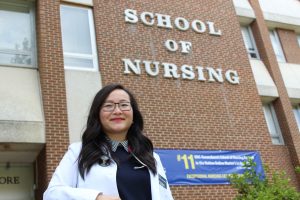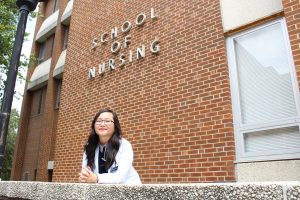 Lisa Yang’s mother grew herbs around the house that she believed could alleviate everything from a cold to a kidney stone.
Lisa Yang’s mother grew herbs around the house that she believed could alleviate everything from a cold to a kidney stone.
If one of Yang’s relatives didn’t feel well, the cultural belief was that the illness – if not caused by natural factors – was the result of spiritual ones. Perhaps a deceased ancestor had brought it.
“With our culture, there’s really no such thing as primary care,” Yang said. “We only go to the doctor when you’re deadly sick or when you really do need help.”
Yang’s family immigrated from Laos to avoid the Vietnam War and eventually settled in North Carolina. They belong to the Asian ethnic group known as Hmong, and their traditional ways sometimes clash with the advanced training of Western medicine that Yang has received as a UNC Greensboro School of Nursing doctoral student.
Yang plans to become a nurse practitioner, and her hope is to help bridge the language and cultural barriers that keep members of the Hmong community from seeking medical attention in the United States. That lack of attention often leads to more serious health issues for them.
“For elderly Hmong patients, there might be a higher trust level because we are able to speak the same language and I can understand cultural aspects,” said Yang, who was raised in Hickory, N.C. “There still may be a few language barriers because each language may have terms that don’t exist in another language. However, for the most part, I think anyone would be delighted to have someone who can speak their language and understand their cultural beliefs.”
Yang started working as a registered nurse in the trauma intensive care unit at Wake Forest Baptist Health in Winston-Salem after earning her bachelor of science in nursing (BSN) degree from UNCG in 2015. She treats patients involved in traumatic accidents, such as car crashes, falls, and gunshot wounds.
However, Yang has known since she was in high school that she wanted to do something to improve the health of her Hmong community.
 As a teenager, Yang had to accompany her mother to doctor’s appointments and translate in Hmong, which is also a language, what they were being told. At the time, Yang wasn’t familiar with medical terms and simply had to hope that the message she was passing along to her mother was accurate.
As a teenager, Yang had to accompany her mother to doctor’s appointments and translate in Hmong, which is also a language, what they were being told. At the time, Yang wasn’t familiar with medical terms and simply had to hope that the message she was passing along to her mother was accurate.
Yang has noticed more of her family members are being diagnosed with Stage III and Stage IV cancer, in part because they’re unaware of preventative treatments and don’t regularly get a checkup from a primary care doctor.
“I think it’s not trusting doctors because you don’t really understand what they’re saying,” Yang said. “Or if there is an interpreter, the interpreter might not fully 100 percent comprehend what the medical language is in our culture. So, it’s a little bit of mixed information. It’s also trying to understand modern Western medicine in comparison to cultural practices and beliefs.”
In 2017, two years after earning her BSN, Yang returned to UNCG to pursue a doctor of nursing practice (DNP) degree with an adult-gerontological primary care nurse practitioner concentration. She has continued to work in the trauma ICU while taking classes, and she’s scheduled to graduate with her DNP in 2021.
“When I was in high school, I kind of realized that there was a big barrier between our culture and healthcare, and so I always wanted to do something to help people,” Yang said. “But I just didn’t know what.”
Story and photography by Alex Abrams, School of Nursing